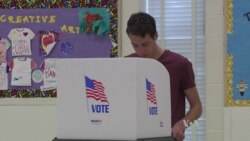Republican presidential nominee Donald Trump has said he fears the U.S. election, now just three months away, will be "rigged" against him.
Margaret Jurgensen's job is to keep that from happening in Montgomery County, Maryland, a populous area adjacent to Washington.
Jurgensen heads the county's board of elections. "The person who says that the system is rigged probably hasn't spent any time with an election administrator," she says.
This fiery election season, distrust of the electoral system is running high on both the left and the right. Supporters of Vermont Senator Bernie Sanders, who competed against Hillary Clinton for the Democratic Party's nomination, say the party's national leaders worked against him in order to nominate the former secretary of state.
Here on the front lines of democracy, Jurgensen says she's never seen a stolen vote in 20 years in the business. Experts say documented cases of voter fraud are few and far between, given the size of the U.S. electorate.
Security vs. access
But the debate over the sanctity of elections, like seemingly everything else in this political season, is loud and acrimonious.
It basically breaks down this way: "Republicans are more concerned with security. Democrats are more concerned with access," says John Fortier, director of the Democracy Project at the Washington-based Bipartisan Policy Center.
It plays out, for instance, in fights over voter rolls and identification laws.
County election boards maintain lists of registered voters. These voter rolls are in constant flux as people move, die, change names through marriage or divorce, and so on. Keeping them up to date is a year-round job.
In a county of a million residents, "we're processing 30,000 documents every month," Jurgensen says. "It's not as though we only work two days a year."
In jurisdictions where the lists of voters are not vigorously maintained, Republicans see opportunities for fraud. "The rolls are messy and allow for some worries that people will take advantage of that," Fortier says.
But voter-roll purges in several states have gone to court over allegations that they target minority voters.
Republicans also have pushed to require voters to show identification when they go to cast ballots at their polling places, but several state ID laws have been struck down this year. Minority, low-income and elderly voters, who often vote for Democrats, are also more likely to not to have accepted forms of ID.
Occasional, not systemic
The threat of election rigging is vastly overblown, says Lonna Atkeson, political science professor at the University of New Mexico.
"Is there ever fraud? Yes. Occasionally," she says. "But there's not any evidence of systematic fraud. And it's really pretty rare."
Trained election workers staff each polling station. Both parties can send monitors to any precinct. And officials will audit precincts at random before they certify the election.
"We have a lot of people who are watching the process," Jurgensen says.
What about hacking the voting machines?
While some machines are more secure than others, "it would be hard to do something on a grand scale and get past security," Fortier says.
Machines that keep both electronic and paper records are becoming more common. Officials can check them against each other if they suspect foul play.
But equipment - as well as laws and practices - varies across the country, and Fortier says that can raise concerns.
"Fundamentally, we have a pretty fair system and it works quite well and the outcome is what voters intended it to be," he says. "But certainly, around the edges and in specific places and in specific areas, there's a lot that could be done."
But calling the system rigged? Fortier says that's going too far.






